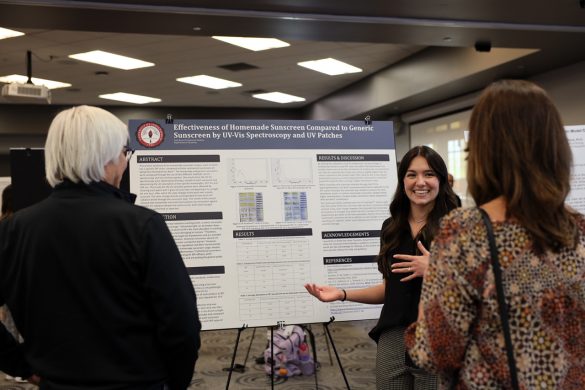Many of the University of Indianapolis faculty have written and published academic or scholarly books. University Chaplain Rev. Jeremiah Gibbs’ first book “Apologetics after Lindbeck” is derived from his dissertation and has been about five years in the making. “Apologetics after Lindbeck” takes a look at postmodern theology and how it deals with faith and reason.
“It is a scholarly book, an academic book, that is trying to show how … a postmodern theologian deals with faith and reason, and how that would affect the ways that we try to defend Christianity,” Gibbs said. “If we were going to say Christianity is true, then how would we be able to do that in a postmodern world? And it takes one particular theologian, George Lindbeck, and uses him as kind of an example as a postmodern theologian, and hopefully draws implications on how others would be able to do apologetics in a postmodern world. Apologetics is the Christian defense, rational defense of the faith, so trying to use logic and reason to be able to show that Christianity is true.”
In December 2013, Gibbs finished his dissertation and got it approved. It took a year before he even pursued the idea of publishing it. In the book, Gibbs talks about how he believes Christianity is beautiful. It is one of his favorite parts about the book.
“There is a section of the book where I talk about Christianity as the most beautiful way of life,” Gibbs said, “and that was a lot of fun because a lot of folks don’t think of Christianity as being beautiful. But when I see redemption in people’s lives, and when I see the beautiful story of God’s giving God’s self for us, I think that’s beautiful. So it was fun for me to think about Christianity as a beautiful story and to think about how the beauty of the Christian story appeals to people.”
Although Gibbs’ favorite part of the book looks at the beauty of Christianity, he still recognizes that it was a dissertation that needed to be done.
“This was my dissertation project. Every person who earns a Ph.D. has to write a dissertation. Some of them, like in the sciences, write relatively short dissertations, 100 pages or 200 pages,” he said. “So they write relatively short dissertations because the primary part of a scientist work is what’s in the lab and the findings of the lab report. But in the humanities, the expectation is that you would write something long enough to be kind of a book-length manuscript. So every one of our Ph.D. faculties in humanities, and frankly most of our Ph.D. faculties, have written [a] book-length manuscript. There’s also an expectation for faculty that they would publish. Because I’m a chaplain, the expectation for me publishing books is different than [for] our full time faculty. But almost all of our full-time faculty have written books because it’s part of the expectations of scholarship. So it’s just part of what we do. So I hope that there are parts of it that are inspired, but it was per the work, it’s part of school.”
Gibbs’ book explores the Christian idea of postmodernity and a postmodern way of understanding.
“I think many Christians have not been able to make sense of truth in a postmodern world. Many Christian leaders have said that postmodernity and postmodern ways of understanding knowledge are just not valid,” Gibbs said. “And there are too many people convinced that the postmodern ways of understanding knowledge are true, are right. Many Christians have just ignored that. Other Christians have said well, okay, if we accept the critique of postmodernism then we can’t make the claim that Christianity is the most truthful religion. And I want to be able to say both of those things. I want to say yes to postmodernity, and I want to say yes to Christianity as the most truthful religion — not just religion, but most truthful way of viewing the world. And so I think people, especially pastors, theologians, and scholars that are really interested in these questions should read the book because it can give a way of understanding the truthfulness of Christianity in a postmodern kind of way of thinking.”
“Apologetics after Lindbeck” is directed toward church leaders and theology scholars. Down the road, Gibbs’ goal is to come out with a book about the same idea but just geared toward the Christian sitting in the pew.







